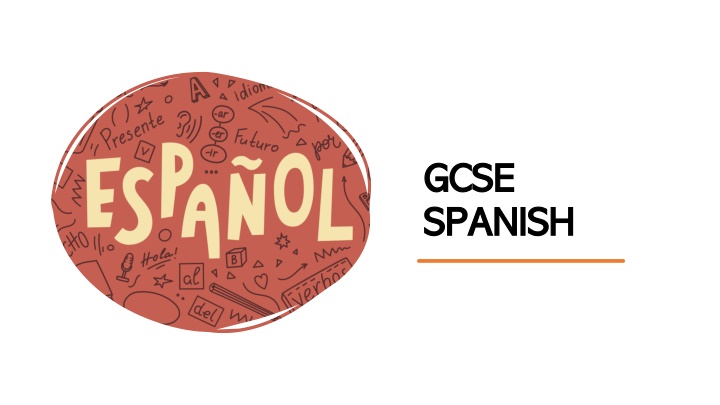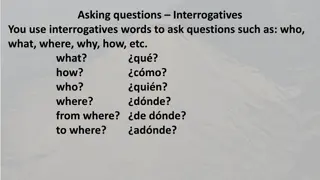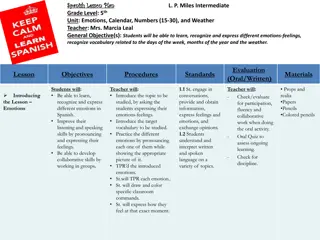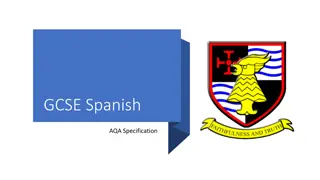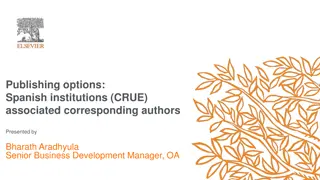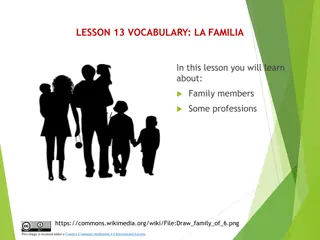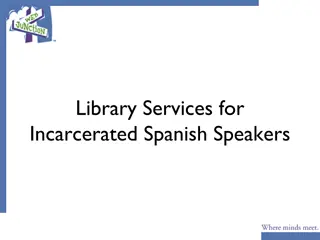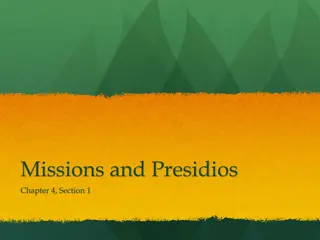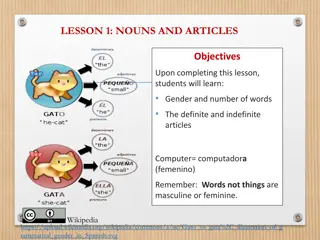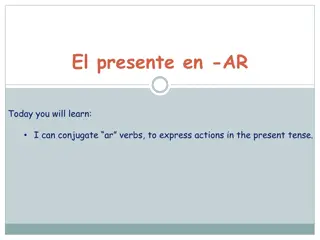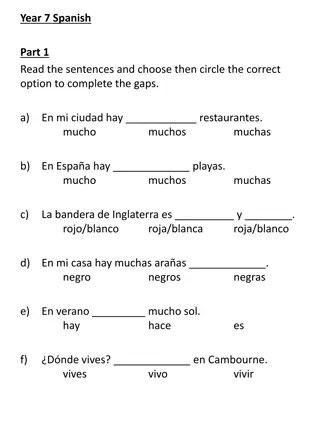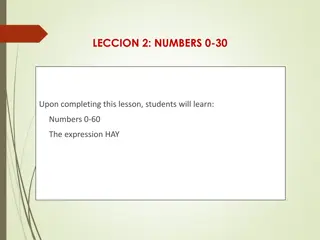The Importance of Learning Spanish: Benefits and Opportunities
Speaking another language like Spanish can significantly benefit your career prospects, cognitive abilities, and cultural understanding. Learning Spanish not only boosts employability but also enhances communication skills and confidence. Studies show that regret of not engaging with languages in school is common among adults. The EBacc curriculum emphasizes the importance of studying essential subjects, including languages, for future success and opportunities.
Download Presentation

Please find below an Image/Link to download the presentation.
The content on the website is provided AS IS for your information and personal use only. It may not be sold, licensed, or shared on other websites without obtaining consent from the author.If you encounter any issues during the download, it is possible that the publisher has removed the file from their server.
You are allowed to download the files provided on this website for personal or commercial use, subject to the condition that they are used lawfully. All files are the property of their respective owners.
The content on the website is provided AS IS for your information and personal use only. It may not be sold, licensed, or shared on other websites without obtaining consent from the author.
E N D
Presentation Transcript
GCSE GCSE SPANISH SPANISH
If all of the languages spoken in If all of the languages spoken in the world were proportionally the world were proportionally represented by 100 people on represented by 100 people on an an aeroplane aeroplane Blue Stamp Travel: Work Experience Abroad & Language Courses
Speaking another language can help you to stand out from the crowd in a multitude of career paths Studying a language fits nicely with the majority of subject choices for current and future study. Why study Spanish? Scientists believe knowledge of a second language can boost your brain power alongside enhancing your analytical and creative skills and improving your cognitive development. Employers believe knowledge of a second language boosts your employability demand for languages skills is booming in the global job market. Speaking another language helps break down cultural barriers and encourages better understanding of different people s perspectives. Language influences culture and being able to speak another language can help you better understand the world. AQA | Subjects | Languages | GCSE Languages specification changes
A recent study shows that nearly one in two adults who cannot have a conversation in a modern language regret not engaging more with languages at school. Speaking another language helps you to be more confident when travelling and exploring the world, allowing you to be fully immersed in local life. Why study Spanish? Learning another language helps you to develop really useful transferable skills, like being a good communicator, having an ability to listen and also confidence in delivering presentations in the workplace. These are the things that give your overall confidence levels a boost and add value to your CV. Learning another language improves our aptitude for study itself, especially our listening and communication abilities. Speaking another language shows you're not afraid of making mistakes you are constantly learning to improve and enhance your skills and knowledge. AQA | Subjects | Languages | GCSE Languages specification changes
The EBacc is a set of subjects at GCSE that keeps young people s options open for further study and future careers. The Ebacc is: English language and literature Maths The sciences EBacc Geography or history A language EBacc impact: EBacc impact: The EBacc is made up of the subjects which are considered essential to many degrees and open up lots of doors. A study by the UCL Institute of Education shows that studying subjects included in the EBacc provides students with greater opportunities in further education and increases the likelihood that a pupil will stay on in full-time education. Sutton Trust research reveals that studying the EBacc can help improve a young person s performance in English and Maths. English Baccalaureate (EBacc) - GOV.UK (www.gov.uk)
Subject aims GCSE specification in Spanish should provide a coherent, satisfying and worthwhile course of study. They should encourage students to develop confidence in, and a positive attitude towards, Spanish and to recognise the importance of languages. They should also provide a strong linguistic and cultural foundation for students who go on to study languages at a higher-level post-16. Through studying a GCSE in a modern foreign language, students should develop their ability and ambition to communicate independently in speech and writing with speakers of the language for authentic purposes and about subjects which are meaningful and interesting to them. The study of a modern foreign language at GCSE should also build students confidence and broaden their horizons, enabling them to step beyond familiar cultural boundaries, develop new ways of seeing the world, and better understand relationships between the foreign language and the English language. It is important that students following a GCSE course should become familiar with aspects of the contexts and cultures of the countries and communities where the language is spoken. Linguistic content may be developed through a range of broad themes and topics which have, for example, cultural, geographical, political, contemporary, historical or employment-related relevance. Linguistic content which is largely, though not exclusively, determined by frequency will enable material relating to most broad themes and topics to be used, and will unlock a wide range of spoken and written texts. French, German and Spanish GCSE subject content (publishing.service.gov.uk)
What is involved in GCSE Spanish? The content of Spanish GCSE for the new specification beginning in 2024 is split across 3 key themes: Theme 1 People and Lifestyle. Theme 2 Popular culture. Theme 3 Communication and the world around us. All three of these themes directly build and relate to what you have been studying so far over the last 3 years in KS3 (Free time activities, Travel and Tourism, Media and Technology, Identity and Relationships )
Where will languages take you? Blue Stamp Travel: Work Experience Abroad & Language Courses
